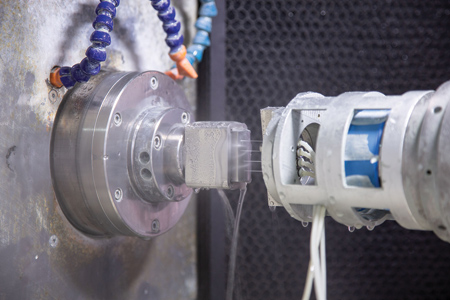
The curvature-adaptive multi-jet polishing technology developed by PolyU can significantly improve the efficiency of high-quality ultra-precision polishing.
The Hong Kong Polytechnic University (PolyU) has developed a novel curvature-adaptive multi-jet polishing (MJP) technology for different kinds of freeform surfaces, i.e., surfaces without symmetry axis, which are widely used in high end products such as compound lenses in 3D imaging, head-up display (HUD) lenses used in automotive, optical components for augmented reality and virtual reality headsets, etc. Time efficiency and surface quality improvement were the main goals of the technology research. "This technology can meet the stringent requirements for ultra-precision and high efficiency in polishing to reduce the surface roughness in high-value-added products, such as artificial joints, turbine blades of aeroplanes and other components with complex geometric shapes," said a company spokesperson. PolyU's technological breakthrough in high quality polishing will add great value to high-end precision equipment manufacturing.
The cutting-edge technology is developed based on the current Fluid Jet Polishing (FJP), an ultra-precision non-contact polishing technology that pumps the pre-mixed slurry, i.e., abrasive particles and water, through an adjustable nozzle directly towards a target surface at appropriate speed to polish the surface of the freeform products to the desired finish. PolyU's research team customized multi-jet nozzles and developed a computerized system to automate the process and to control the fluid pressure and processing time of each jet according to the shape, variation of curvature and surface polishing requirements of a workpiece. The technology can thus be applied to most of the freeform products, including products with various complex curved designs and inner surface finishing of pipe-shaped products.
Similar to FJP, MJP also offers high machining accuracy, is suitable for polishing complex surfaces, and will not cause tool wear and temperature increase of the workpiece during polishing. MJP, however, has additional advantages in ultra-precision polishing. It can overcome the limitations of FJP to improve the material removal rate and the polishing efficiency for large-scale surfaces, lens array surfaces and inner surfaces polishing.
The higher efficiency of MJP compared with that of FJP tool has been validated through an experiment. In the experiment, the FJP polishing procedure on a 4x4 lens units array took about 320 minutes as the lens in the array was polished one after another and each unit requires 20 minutes. However, if a MJP tool is used, it only takes 20 minutes to polish all the lens because they were polished simultaneously. In this case, the processing time for using the MJP tool has been significantly improved by about 16 times as compared to FJP.
Leading this innovative project, Ir Professor Benny CHEUNG, Head of State Key Laboratory of Ultra-precision Machining Technology, PolyU, said, "Surface finishing especially for freeform surfaces can be expensive, time consuming, labor intensive and error prone. FJP has its limitation in efficiency, so it has only been used in small size surfaces. MJP can be applicable to various industrial fields, such as high-precision optical components and molds, aerospace components, automotive systems, semi-conductor plants, as well as biomedical engineering industries. The beauty of MJP solution includes high efficiency and lower cost without compromising on the polishing quality. We believe the technology could bring substantial benefits to the advanced manufacturing industries."
"The design and production cost of a MJP machine innovated by PolyU will only be at about two-thirds of the cost for the commercialized FJP machine. Moreover, the MJP system can be adapted and integrated into the existing polishing machines or robotic arms, which will further cut down the set-up cost," said the spokesperson.
The technology recently won a Silver Medal as well as two Special Merit Awards at the 47th International Exhibition of Inventions of Geneva, 2019.
The research team plans to further enhance the technology by developing apparatus fit for plugging in 3D printers for enhancing the efficiency of post-process finishing of 3D-printed complex components. Visit www.youtube.com/watch?v=9BM8NOUc_FE for a video on ultra-precision polishing technology.
For more information contact:
The Hong Kong Polytechnic University (PolyU)
www.polyu.edu.hk